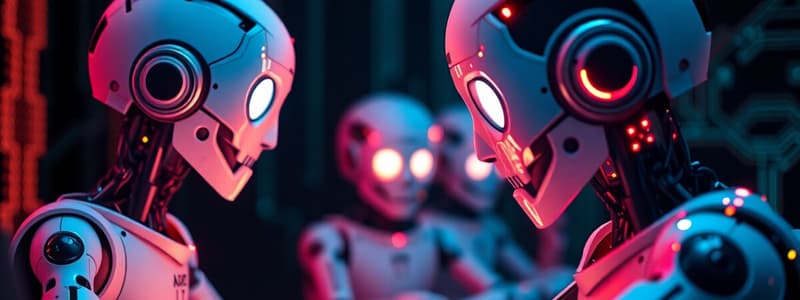Podcast
Questions and Answers
What is the primary belief behind the Dead Internet Theory?
What is the primary belief behind the Dead Internet Theory?
- Social media is entirely free from automation.
- The internet is solely driven by human interactions.
- Real users create the majority of content online.
- Bots and AI have replaced human-generated content on the internet. (correct)
Which platform is mentioned in relation to the Dead Internet Theory?
Which platform is mentioned in relation to the Dead Internet Theory?
- X (formerly Twitter) (correct)
What emotion is expressed by the original poster of the Dead Internet Theory?
What emotion is expressed by the original poster of the Dead Internet Theory?
- Hope for the future
- Joy and excitement
- Unease and disappointment (correct)
- Indifference towards online content
What evidence does the original poster use to support his claims?
What evidence does the original poster use to support his claims?
What recent occurrence highlighted the prevalence of bots on X?
What recent occurrence highlighted the prevalence of bots on X?
What does the Dead Internet Theory suggest about the role of influencers?
What does the Dead Internet Theory suggest about the role of influencers?
In what era did the Dead Internet Theory begin to gain attention?
In what era did the Dead Internet Theory begin to gain attention?
What aspect of internet interaction is highlighted in the Dead Internet Theory?
What aspect of internet interaction is highlighted in the Dead Internet Theory?
What aspect of online content does the Dead Internet Theory primarily address?
What aspect of online content does the Dead Internet Theory primarily address?
What is one key emotion expressed by the original poster regarding the state of the internet?
What is one key emotion expressed by the original poster regarding the state of the internet?
Which of the following claims is made about the popular memes mentioned in the post?
Which of the following claims is made about the popular memes mentioned in the post?
How does the proliferation of bots reportedly affect the experience on social media platforms like X?
How does the proliferation of bots reportedly affect the experience on social media platforms like X?
What was a significant consequence of the mistaken video upload on X?
What was a significant consequence of the mistaken video upload on X?
In what way have social media sites attempted to combat the effects of bots according to the theory?
In what way have social media sites attempted to combat the effects of bots according to the theory?
What transformation does the Dead Internet Theory claim has occurred in internet interaction?
What transformation does the Dead Internet Theory claim has occurred in internet interaction?
What is suggested about the relationship between influencers and bots in the theory?
What is suggested about the relationship between influencers and bots in the theory?
What fundamental change does the Dead Internet Theory suggest has occurred in the composition of online content?
What fundamental change does the Dead Internet Theory suggest has occurred in the composition of online content?
According to the original poster, what feelings do they express about the current state of the internet?
According to the original poster, what feelings do they express about the current state of the internet?
What could the popularity of certain memes imply, according to the theories discussed?
What could the popularity of certain memes imply, according to the theories discussed?
What misconception about the role of bots in content creation is addressed in the information?
What misconception about the role of bots in content creation is addressed in the information?
How did users react to the mistakenly uploaded video on X regarding the sound of Kazakh?
How did users react to the mistakenly uploaded video on X regarding the sound of Kazakh?
What is a significant impact of generative AI on e-commerce platforms, as mentioned in the content?
What is a significant impact of generative AI on e-commerce platforms, as mentioned in the content?
What strategy have social media sites employed in response to the rise of bots?
What strategy have social media sites employed in response to the rise of bots?
What phenomenon does the Dead Internet Theory highlight regarding user interactions online?
What phenomenon does the Dead Internet Theory highlight regarding user interactions online?
Study Notes
Dead Internet Theory
- The Dead Internet Theory believes that AI-generated content and bots have replaced most online activity.
- The theory suggests that people are no longer shaping the internet's direction.
Origin and Spread
- The theory gained traction in the late 2010s on 4Chan.
- A detailed post on the forum, "Agora Road’s Macintosh Cafe", solidified the theory in 2021.
Key Arguments
- The theory argues that online interactions are less human and more algorithmic, primarily focused on selling products and ideas.
- It suggests the internet is controlled by AI bots drowning out human content.
Evidence and Examples
- The popularity of certain memes (Raptor Jesus, Foul Bachelor Frog, Pepe the Frog) is used as evidence of AI evolving.
- The "Kazakh sound" post, originally without audio, garnered 24,000 likes and 2000 reposts on X, leading users to believe bots were involved.
- The "cooked" narrative on X, pointing to a decline in user experience due to bot activity, has become a common talking point.
Rebuttals
- Social media platforms are actively fighting spam bots.
- Bots primarily repost user-generated content, not lead online activity.
- Influencers are the driving force, with bots following their lead.
Impact
- The internet has become more sterile and controlled.
- Large corporations dominate online platforms, prioritizing monetization over user experience.
Overall
- The Dead Internet Theory suggests a decline in human agency online.
- While AI-generated content is impacting the internet, it's not yet taking over completely.
- The internet today is vastly different from the early days, with less user-generated content and more corporate influence.
The Dead Internet Theory
- The belief that the internet is dominated by bots and AI-generated content
- Originated on 4Chan and gained popularity on the Agora Road forum in 2021
- Popularized by a post titled "Dead Internet Theory: Most Of The Internet Is Fake" by a Californian man
- Maintains that genuine human interaction and content creation are diminishing
- Claims that the internet is becoming increasingly controlled and algorithmic, serving primarily to sell products and ideas
- Uses meme examples like Raptor Jesus and Foul Bachelor Frog to illustrate AI evolution and influence
Evidence and Supporting Arguments
- Example of a video on X (formerly Twitter) that gained significant likes and reposts, despite being mistakenly uploaded without sound
- The "Dead Internet Theory" suggests that bots were responsible for amplifying the post
- X users argue that the platform is "cooked" due to widespread bot activity
- This theory is not limited to X, with generative AI being used on sites like Amazon
- AI is being used to autofill product descriptions and names on Amazon
Counterarguments
- Social media platforms have historically implemented measures to combat bots, even as they become more sophisticated with AI advancements
- While bots exist, they primarily amplify content created by human influencers, rather than directing the internet
- The theory overlooks the continued presence of human interaction, creativity, and content creation
Impact and Current State
- The current internet feels more sanitized, corporate, and restricted than in the past
- The shift from diverse user-created sites to large platforms built by corporations has impacted the internet's landscape
- The focus on monetization and user data has led to a diminished user experience
- Even Tim Berners-Lee, the creator of the World Wide Web, expresses disappointment with the internet's current state
Conclusion
- While the theory of an internet dominated by bots is a popular concern, it's important to acknowledge that the internet still thrives on human connection and ingenuity
- The rise of corporate influence and AI advancements have undoubtedly impacted the internet's experience but haven't entirely replaced human interaction.
Dead Internet Theory
- The Dead Internet Theory posits that most internet activity stems from bots and AI-generated content, leaving little room for human interaction.
- The theory gained prominence in 2021 after a post on the Agora Road's Macintosh Cafe forum.
- The original poster, a Californian man, expressed concern about the lack of genuine human interaction on the internet.
- He suggested that AI has taken over, leading toward a more controlled online environment.
- This theory was amplified by events on X (formerly Twitter), where numerous posts with an abnormal number of likes and reposts were attributed to bots.
- Some X users believe that the platform is "cooked" due to the prevalence of bots.
- However, while bots are present, they are not entirely driving the internet.
- Influencers still hold significant influence on the internet, with bots following their lead.
- The internet today differs significantly from the past due to the rise of large corporations controlling key platforms.
- The internet is now seen as more sterile compared to the wild, unpredictable internet of the past.
- The inventor of the World Wide Web, Tim Berners-Lee, is disappointed with the current state of the internet.
- Even with the presence of some AI-generated content, interesting trends like the "Grimace Shake" prove that human interaction remains present.
Key Arguments
- The theory argues that AI now drives online content creation and engagement.
- This is largely based on the proliferation of bots on social media platforms like X (formerly Twitter).
- The theory also argues that these bots have replaced genuine human interaction, leading to a more controlled and manipulated online landscape.
Evidence supporting the theory
- The widespread presence of bots on different internet platforms
- The lack of authentic human interaction on websites.
- A sense of unease and alienation experienced by many users.
- The increasing algorithmic control over online content.
Critiques of the theory:
- Influencers remain powerful figures on the internet, with bots following their lead.
- Human activity on the internet persists, evidenced by trends like the Grimace Shake.
- The internet still offers opportunities for genuine human connection and interaction.
- While bots are present, they don't completely control the internet.
Conclusion:
- While the Dead Internet Theory highlights concerns about bot activity and algorithmic control, the internet is not entirely populated by bots.
- Human creativity, interaction, and influence still play a significant role, suggesting a more complex and nuanced online landscape.
Studying That Suits You
Use AI to generate personalized quizzes and flashcards to suit your learning preferences.
Description
Explore the Dead Internet Theory, which posits that AI and bots have taken over online interactions, diminishing human engagement. Delve into its origins, key arguments, and the evidence supporting this intriguing hypothesis about the current state of the internet.




